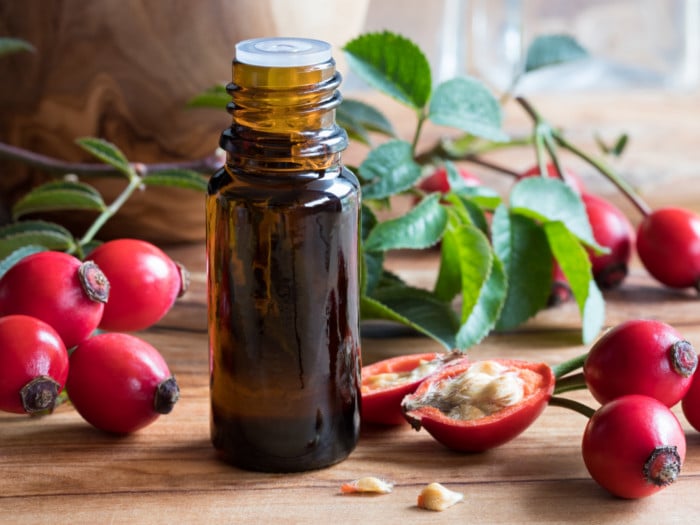Using rosehip oil can be an easy and effective way to improve skin health, along with many other great health benefits, but it is also important to use this oil properly!
What is Rosehip Oil?
Rosehip oil or rosehip seed oil is the essential oil from the seeds of a specific species of rose, Rosa aff. rubiginosa, and can be found in the rosehip, which is the structure that is left behind once the rose has bloomed. These seeds can be cold-pressed or the oil can be extracted through various distillation processes. Grown primarily in areas of South America, the seeds from this species of rose are highly sought after since it was recognized early on that the oil within these seeds was incredibly potent. This oil is primarily known for its benefits for skin, but it has a variety of other applications as well. [1]
The active ingredients in this oil include a number of volatile acids, such as oleic, linoleic, palmitic, and linolenic acids, all of which play critical roles in overall health. The oil is also rich in vitamins and nutrients, including vitamin E, vitamin C, beta-carotene, and vitamin D. Historically, the use of this oil dates back more than 4,000 years in various parts of the world, as the benefits of this oil have been proven generation after generation.
Rosehip Oil Benefits
The most notable benefits of this oil include its ability to
- Relief from eczema, acne, and psoriasis
- Prevent premature aging
- Relief from sunburn
- Moisturize the skin
- Improve nail health
- Boost the immune system
- Improve hair health
- Increase estrogen levels
- Strengthen bone health
Let us discuss them in detail below.
Anti-aging Properties
With an impressive collection of antioxidant compounds and vitamins, this oil is very good for preventing the signs and symptoms of premature aging, including wrinkles, age spots, blemishes, and other marks on the skin. Some of these antioxidants can also improve skin elasticity, making it harder for wrinkles to appear! [2]
Skin Care
If you are suffering from any sort of inflammatory condition, such as eczema, acne, psoriasis or rosacea, you can apply a few drops of this oil and see very rapid results. The quick-healing properties of rosehip oil will induce circulation, while also protecting against infection for wounds or irritated areas. [3]
Sunburn
Rosehip oil is rich in vitamin C and helps in relieving inflammation caused by sunburn. [4]
Nail Health
Use of rosehip oil also helps in strengthening the nails and improving their growth.

Rosehip seed oil is loaded with skin-nourishing vitamins and essential fatty acids. Photo Credit: Shutterstock
Osteoarthritis
The anti-inflammatory and antioxidant nature of this oil means that it can help to reduce inflammation in the joints and strengthen the space between the bones. This will result in less pain and discomfort as you age, as well as a lower risk of osteoarthritis. [5]
Immune System
With high levels of vitamin E, this oil is excellent for the immune system, as it can stimulate the release of white blood cells, which are the body’s first line of defense against infections and pathogens. [6]
Hair Health
Research has found that applying this oil to your hair can help to prevent dandruff and hair loss, while also helping to clear up symptoms of split ends and itchiness on the scalp. [7]
Hormone Balance
This oil encourages the production of estrogen in the body, which is good news for certain women, particularly those going through menopause, who are losing their estrogen levels and experiencing hormonal fluctuations. [8]
Healing Speed
Antioxidants and anti-inflammatory acids in this oil are able to increase the healing speed of wounds on the body, particularly when the oil is topically applied. However, it can also help to heal when consumed. [9]
How to Use Rosehip Oil?
You can use this oil in many different ways, depending on the health condition:
- Eczema or Psoriasis: In most cases, you will want to apply this oil topically to an area of the skin that needs attention, such as a patch of psoriasis or eczema. You only need 2-3 drops of the oil and can rub it directly into the skin, where it should quickly absorb.
- Wrinkles: You can also do this with a single finger under the eyes for dark bags, or if you want to minimize the appearance of wrinkles.
- Skin Cleanser: Some people prefer to mix rosehip oil with other essential oils and creams to create a face wash or scrub.
- Hair Conditioner: You can also rub 4-5 drops into your hands and then rub it deep into the scalp, like a conditioner, before rinsing it out with warm water 10-15 minutes later.
Side Effects of Using Rosehip Oil
There are some side effects of using or consuming this oil, such as gastrointestinal distress, topical irritation, drug interactions, and complications with pregnancy.
- Pregnancy: Due to a lack of research, and the powerful effects that this oil can have on estrogen levels in the body, pregnant and nursing women should avoid the use of this oil.
- Stomach Issues: This oil is not consumed all that often, but when it is, it can quickly lead to gastrointestinal distress, including nausea, vomiting, and stomach upset. If any of these symptoms occur, change the dose or discontinue use entirely.
- Topical Irritation: Although this oil is meant as a topical remedy, it can cause inflammation or irritation on the skin, particularly if an excessive amount is used.
- Drug Interactions: This oil may have drug interactions if consumed, even in small amounts, particularly if you are taking medication for hormone imbalance, or if you are regularly taking oral contraceptives.
